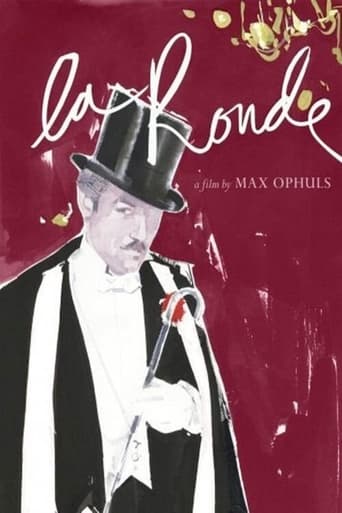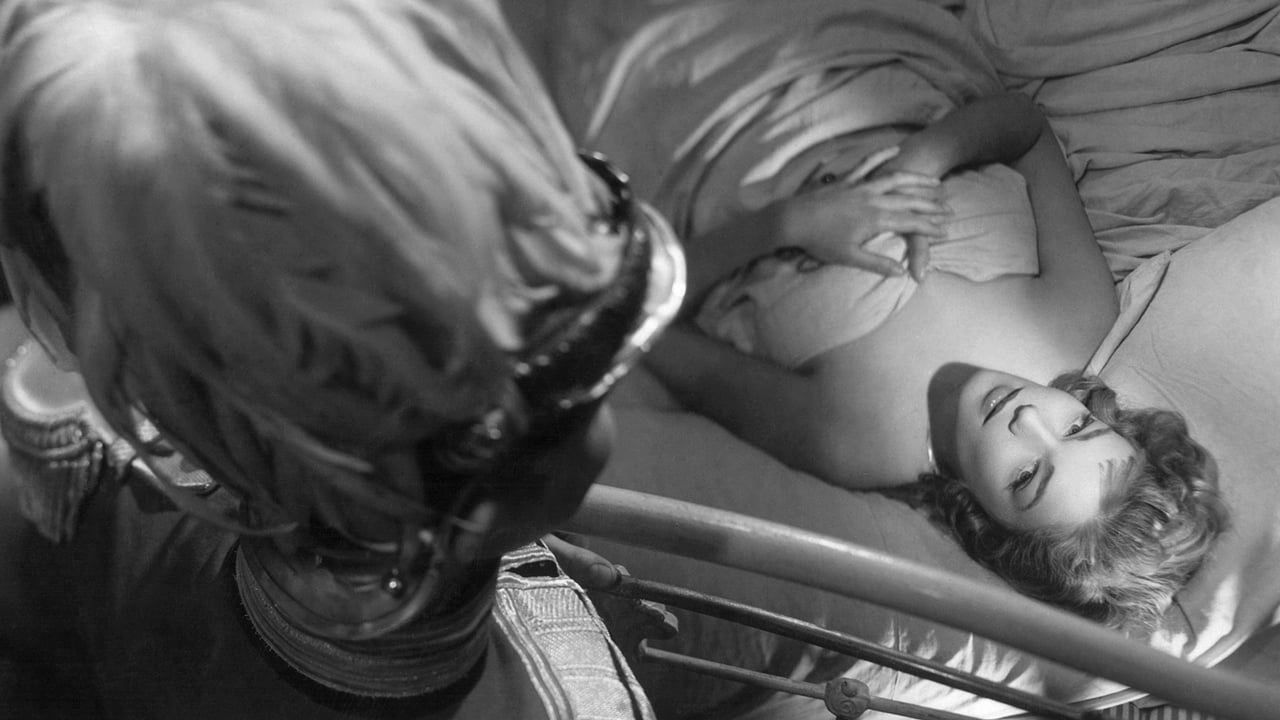lasttimeisaw
My very first Ophüls film, a breezy studio-bound adaption of Arthur Schnitzler's play "Reigen", set in the 1980s in Vienna (yes, I'm freshly returning from a one-week vacation in Vienna). Structurally, LA RONDE adheres firmly to the play's ten liaisons, each stars one pair of its 10 characters in a sequential order, starts with the whore (Signoret) and the solider (Reggiani), then the soldier and the housemaid (Simon), the housemaid and the young gentleman (Gélin), and so forth until it finishes with the Count (Philipe) and the whore, thus consummates "la ronde".One prominent change is that Ophüls introduces an all-knowing raconteur (Walbrook), who is quite omnipresent, not only shepherds viewers into each story, but takes on minor roles whenever transition from one scene to another is needed as well, Walbrook is vivacious and stylish as the master of ceremonies, croons the theme strain from time to time, slyly breaks the fourth wall or intervenes in the happenings occasionally; whereas the sundry characters are primarily driven by their desire and impulsion regardless of their identities, each is equally allotted a fifteen-minute or so screen time divided into two parts with two different opposite-sex, like the merry-go-round in the background, they flirt, seduce, debate, banter and having sex (off-screen) in the most casual fashion, when they put on their clothes again, no string is attached, they can continue a small talk like friends or just move on to the next chapter without hesitation. It is the quintessential of cinematic operetta doesn't impose on lecturing viewers, only to divert, to flirt, to vivify the atmosphere and to evince the Franco-philosophy of c'est la vie! Essentially the film is a star-studded celebrity parade, household names like Signoret, Simon, Darrieux, Miranda and Philipe etc. are indisputably in their most magnificent form although none of them is given too much fodder to capitalise on, it is all the same, for cinephiles alone, an eye-opening feast to worship, thanks to the fluid camera-work and the florid production exclusively set inside the studio, it is an escapist's utter pleasure to accommodate oneself to a sumptuous period where everything looks so nostalgically charming and beguilingly narcissistic, so we can all be free and easy, at least for 97-minutes.
christopher-underwood
This seems a little old fashioned even allowing for it's period setting. Perhaps it's the reluctance of the director to go beyond even the merest suggestion of congress that gives it an air of something made in the late thirties or forties. It certainly has charm though and Ophul's cameras twirl and glide like the carousel itself. Always looking sumptuous (perhaps it shouldn't) and always light-hearted (perhaps it should be more serious) it is a pleasant enough viewing. Oscar Strauss' music helps enormously and is in complete harmony with the visuals. Simon Signoret as the prostitute, seen at the start and finish is exemplary and Simone Simon shines most brightly as the seductive maid.
MartinHafer
In recent years, most French films I have seen seems to have been sexually obsessed. This is interesting and may account for some of the reason Americans and Frenchmen often don't seem to see eye to eye. American films are many times sexually obsessed as well, though not as apparently often and not in films from the 1930s to the 1960s. However, sex, not love, was the focus in many French films from this same period--such as The Rules of the Game (1939) and La Ronde (1950). Now I am NOT making a blanket indictment of French films--I LOVE many of them and have great respect for the work. However, it's a real shame, as I began watching many more French films in recent months so I could find some good and acceptable French films for students in our school's French classes and I have been FAR less successful than I'd hoped.In the case of La Ronde, the stories, though well presented, do not center on love but sex and STDs. The movie opens with a wonderful narrator (sort of like a cupid who likes to encourage and set up sexual encounters--not making the couples fall head over heals in love). The first is a rather surly soldier who gets a "quickie" under the bridge with a prostitute (this is certainly NOT a romance) and goes from there to various adulterous affairs involving unfaithful wives as well as husbands. We are also told that "love" is very fleeting and NEVER lasts. Perhaps this is true with prostitutes and mistresses, but saying all love is fleeting is a very sad message indeed.If the movie had instead focused on real love and not solely the glandular type, this could have been a VERY sweet and well-crafted movie. As it is, it is a smarmy and still well-crafted movie.The comment made by writers_reign about this movie was brilliant and undoubtedly true. In light of STD transmission, this puts the movie in a new light and makes a lot of sense. Still, is THAT really what you want to see?! YUCK!
Mort-31
Psychology was one of the most important aspects in the plays of Arthur Schnitzler, Vienna's most brilliant and best-known fin de siècle dramatist. German director Max Ophüls knew this of course, still, in my opinion he didn't put psychology first in his very drama-like film version of Schnitzler's play Der Reigen. Ophüls lays quite a lot of weight into the appearances of the mysterious `showmaster', which makes the film rather dark and a little bit spooky, although it is in fact about perfectly ordinary people and their instincts.The actors are French and speak French (although the setting remains Vienna). The language makes the film a little more pathetic than it should be: `l'amour' has completely different qualities than `Liebe' or `love'.
6 out of 10.


 AD
AD


